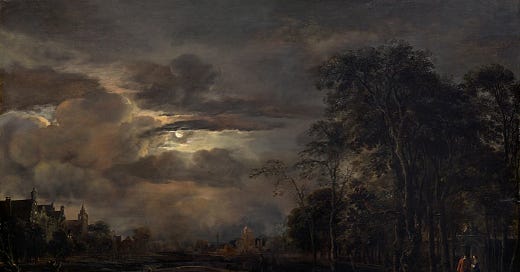content warning: violence
I went to see the new Quiet Place a few weeks ago. I hate scary movies, but for some reason I love this series. The movies, I believe, are ultimately about humanity in the midst of terror. What we do for one another, the ways we cope, the ways a heart can bend and mold and be fortified because of love, because of sacrifice, because of imagination.
But still, all of that love, sacrifice, and imagination comes against a backdrop of death and destruction.
—
As I walked through the bookstore in that beach town this morning, I saw a book sitting there. It was a new nonfiction book about a potential scenario which might lead to nuclear war.
I don’t need something to help me catastrophize; I can do that on my own.
I grew up doing active shooter drills in school. I learned to cower in the corner—lights off—and sit motionless. Praying in my head, silently asking God to protect me and my siblings and my teachers and my friends and my mom and my dad. Silently looking out the narrow window in the door for the glint of a gun or masked man.
I’ve been following the assassination attempt just like everyone else. I’ve read about the boy / shooter. I read that he took a gun from his father. I read he practiced his shot at his local shooting range. I read he bought a ladder from Home Depot and had a homemade bomb in his trunk, just in case.
So, on Monday night, when I was in that outdoor chapel, I went through what I’d do should some kid with his father’s gun decide to do something terrifying.
Is that just America now?
—
This past Sunday I went back to my old church in Los Angeles to visit. It felt enlivening to be there again, to hear the call and response of the liturgy, to smell the incense and receive the Eucharist. This Sunday a deacon gave the homily, and in it he used that famous quote from Martin Luther King Jr. about the moral arc of the universe being long but bending toward justice.
I am not someone to disagree with Dr. King, but I have a hard time seeing any moral arc bending toward justice. Not with books about nuclear war or children with their father’s gun. No, I’m coming to believe the earth is not bent toward justice but catastrophe, that we are in a catechesis of destruction, learning how to implode within ourselves like a dying star.
I think I am growing to agree more with Ta-Nehisi Coates—an atheist—in how he ended his book We Were Eight Years in Power:
“I don't ever want to forget, even with whatever personal victories I achieve, even in the victories we achieve as a people or a nation, that the larger story of America and the world probably does not end well. Our story is a tragedy.”
Yes, I have hope. In God. In family. In friends. But all of that is against a backdrop of calamity, of chaos. I look around and do not see justice; I do not see this ending well.
Does that make me a bad Christian?
—
In the new Quiet Place, there is a scene in which our two protagonists—who were strangers thrown together to attempt survival—put on a show for an audience of only themselves. It’s in a dusty bar. They are silent. The movie’s soundtrack sweeps over the scene as they perform and laugh and smile and stand on that stage taking bows to an invisible audience.
There, in the middle of scorched-earth Harlem, with monsters and terror spindling around them, they allowed their imaginations to create beauty, to write another story. There, for those minutes, they were defiant, learning how to live.
—
Earlier in the church service we got to baptize the son of my rector and her husband. We renounced sin and evil and the devil and baptized him in the Father and the Son and the Spirit, the entire congregation wrapped around the baptismal font, leaning in and looking on in silent anticipation.
Outside that sanctuary the world was still spinning. Motives of assassination were questioned and books on nuclear holocaust were sold.
But there, surrounded by a group of people who were once strangers—a group of people learning to survive—we were doing something Christians have always done: defying death by creating new life.
—
Eugene Peterson said that Christians are people who teach others how to live in a land of death. Life amidst death-dealing. Life amidst assassination plots and attempts. Life amidst nuclear war. Life amidst all of that.
And until what theologians call the eschaton, when the new heaven and new earth will arrive with God’s ultimate justice, when the bottles of heaven will fill with no more tears, when twenty-year-old boys will build worlds instead of destroying them, when swords and AR-15s and nuclear bombs will be turned into plowshares, until then we will always inhabit a land of death.
But—Gospel, Good news—we get to defy it. In a land of death, we get to live.




Thank you for these words. In the midst of all we see, there is hope when we choose to know it.
Wow Drew, thank you for this! It resonates a lot with me.